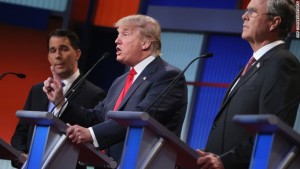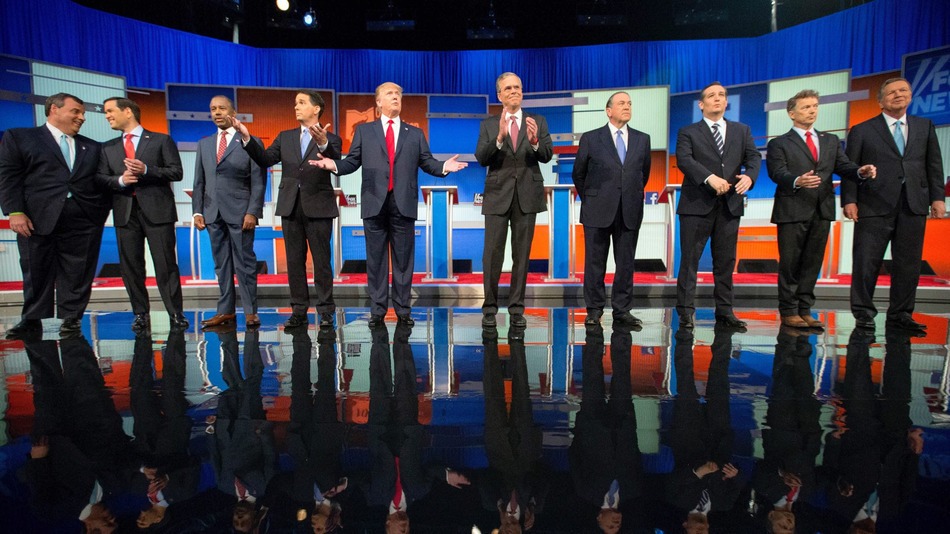Last night’s primetime GOP presidential debate was energetic and revelatory, in my view. I promised yesterday I would try to assess it today, so here’s my attempt. The most efficient approach, I think, is to break it down candidate by candidate. I will not refrain from giving my opinion on each one’s performance, beliefs, and prospects. Consequently, probably no one reading this will agree with me completely, but I’ll stake out my ground anyway.
I’ll cover them in reverse order, from lowest in the polls to highest, as they were placed on the stage.
John Kasich
He got the loudest ovation at the beginning because the forum was being held in his home state, and he apparently got a perk from the RNC to pack as many of his supporters in as possible.
Kasich bothers me. I’ve been put off by his arrogance in the past and by his superficial use of Scripture to promote government assistance. He lost me completely last night when he seemed to rejoice in having gone to a same-sex wedding. Sorry, governor, but that answer only confirmed my view of you. You are not a fighter for Biblical truth. You do not have my support.
Chris Christie
Christie is someone I wish hadn’t thrown his hat into the ring. I’ve never seen him as the torchbearer for the party or for the principles for which I stand. His heated argument with Rand Paul over the NSA was certainly gripping, and, frankly, he made good points whenever Paul didn’t talk over him. Overall, he did better than I expected, but nothing he said moved me in his direction.
Rand Paul
I believe he was one of the big losers of the debate. His argument with Christie did not showcase his temperament well as he had to be pulled back by the moderators to allow Christie to have his say. He claims to be a different kind of Republican. That’s true. But it’s not the kind I can enthusiastically endorse. While I can appreciate his concerns for privacy and government overreach (after all, I’m a small-government type myself), I have no confidence that he really understands what needs to be done for national security. That’s the first job of a president; if you don’t grasp that, you should stay in the Senate instead.
Marco Rubio
Most commentators think that Rubio did himself a lot of good in this debate. I concur. He came across as savvy, well-informed, and appropriately humorous. My only major disagreement with Rubio ever since he won election to the Senate was his participation in the Gang of 8 immigration effort. Yet I still like him. He is winsome, thoughtful, and optimistic about the future of the country. If he is the nominee, I will have no problem giving him my support, but I continue to wish he had waited a few years before attempting this political leap. I would rather have him in the Senate longer to get more seasoning. Now that he will no longer be in the Senate, if he doesn’t win the nomination, I hope he will return to Florida and run for governor. He will have my vote.
Ted Cruz
I love Cruz . . . and I don’t love him. I know that sounds weird. He believes pretty much everything I believe and can articulate those beliefs well. His Christian faith appears to be genuine, and he has a deep concern for abiding by the Constitution. So what is my problem? I’ve listened to a number of his speeches and always come away with at least some distaste for his manner of speaking—a little canned, perhaps, too calculated to get applause lines. I’m also not convinced he can convince a large segment of the electorate to vote for him. He answered all the questions very well last night, and many have pointed to him as one who gained by his participation in the debate. I won’t argue with that. I wish him all the best. My final judgment is suspended, but if he wins the nomination, I’m on his side.
Ben Carson
The moderators lost him for a while, and he had a wonderful comeback about that. In fact, his good humor and thoughtfulness last night was refreshing. His comment about how being a brain surgeon has made him look at what really makes people valuable—what’s on the inside, not the color of one’s skin—was superb. And everyone is commenting on his hilarious closing statement about how he once took out half a brain, but that someone must have beaten him to it in Washington. He is a good man. I like him a lot. Yet I don’t think someone normally should jump from no political involvement at all to being president. Despite the current theme that there are too many career politicians (with which I agree), some experience is essential before taking on the rigors of that top spot.
Mike Huckabee
I have considered Huckabee’s campaign this year to be a well-intentioned but doomed enterprise. I thought he had a better shot in 2012 when he declined to run. That assessment may be true, but last night showed the classic Huckabee ability to speak with conviction and humor. As the Frank Luntz focus group revealed after the debate, Huckabee was the biggest surprise to them, and he won over a number of them who had considered him not in the running. His strong Christian convictions, especially on abortion and the Supreme Court ruling on same-sex marriage, were extraordinary. He has a folksy manner of speaking that can touch the heart and make one rethink a position. He should not be counted out.
Scott Walker
I have a strong preference for Walker. He is one of the most battle-tested politicians in the nation, having had to fight the public-sector unions in Wisconsin continually since his election as governor. He survived a recall election, and won reelection, despite the entire national Democrat party’s attempt to unseat him. Further, he has succeeded in turning Wisconsin around, showing that a Republican can win in a blue state without sacrificing principle. His calm demeanor makes people think he is not exciting enough, but I agree with one commenter afterwards who said that if we make “exciting” our goal, we will miss out on Walker’s amazing talents. Last night, he was solid on every answer he gave, and handled the “gotcha” abortion question very well. I was impressed with the substance of his answers, yet he did not get the audience’s enthusiastic responses the way some others did. He is still my preferred candidate because I look at principle and effectiveness, not superficial excitement. All that said, he would benefit by showing more emotion and having a few more comments like the one when he said that Russia and China probably know more about Hillary’s e-mails than we do. I hope others will look past the external and see the solidity within.
Jeb Bush
If we are to judge a candidate simply for how well he does on a stage and whether he looks presidential, Bush is fine. However, there are issues that come to the forefront that keep me from wanting him as the nominee. He tried to explain his approach to education, saying that his Common Core support is not the same as wanting the federal government to take over. I believe he is mistaken; as Rubio effectively commented later, there is a natural tendency for the federal government to insist on its way in education matters. If Bush doesn’t think that will happen, he is naive.
The worst answer, though, was his attempt to explain why he sat on the board of the Bloomberg Foundation as it poured millions of dollars into Planned Parenthood. He claimed not to know about that, and touted his pro-life credentials when he was governor of Florida. As true as that last part is, I find it incredible that he would then ally with Bloomberg’s agenda. If he is telling the truth about not knowing the agenda, then that’s a further reason for doubting his ability to discern good and evil. For these reasons, I cannot support his candidacy.
Donald Trump
 He may not lose his staunchest supporters after this performance, but I don’t see him picking up others in their right minds. Trump lost it right from the start, in my opinion, when he was the only one on the stage who refused to pledge to support the eventual nominee and not make a third-party run. The groans from the audience were palpable. In essence, he said that unless he is the nominee, there is no one else he respects enough to support.
He may not lose his staunchest supporters after this performance, but I don’t see him picking up others in their right minds. Trump lost it right from the start, in my opinion, when he was the only one on the stage who refused to pledge to support the eventual nominee and not make a third-party run. The groans from the audience were palpable. In essence, he said that unless he is the nominee, there is no one else he respects enough to support.
He then showed a lot of pettiness over the questions being asked of him (which he repeated after the debate, calling them “unfair”). Excuse me, sir, but everyone on that stage was put on the spot for former comments, views, etc. If you were upset by having some of your comments highlighted, you need to ask why there were so many to be highlighted. He was bombastic, insulting, and distinctly non-presidential. In other words, he showed up as himself.
The Luntz focus group afterward savaged him, and the majority began the evening on his side. It was an astounding turnaround. If his poll numbers rise after this debate, it might signal the end of the Republic.
I haven’t said anything about the pre-debate debate, the one showcasing those who didn’t make it into the top ten. The overwhelming consensus is that Carly Fiorina came out of that one in sterling fashion, making the case that she should be in the top tier. I was able to watch the first two-thirds of that debate, and from what I saw, I can say I was impressed with her also. Yes, she deserves more attention. She is knowledgeable, an effective communicator, and strong on principle. I welcome her rise and hope to see it reflected in the polls.
Overall, this debate was illuminating. As I said at the start of this rather long analysis, I don’t expect everyone to like what I’ve said about some of the candidates, but I hope I’ve given some ground for rethinking the viability of the men (and woman) who are telling us they should be the Republican nominee.

